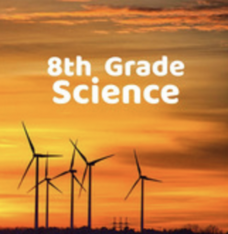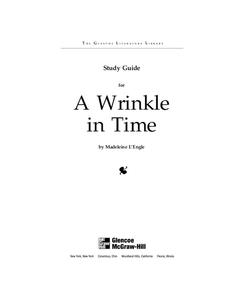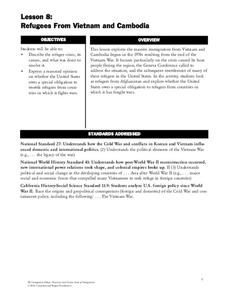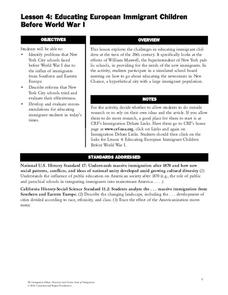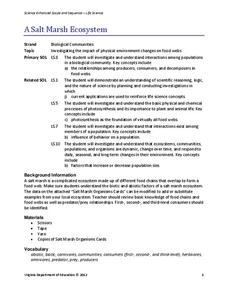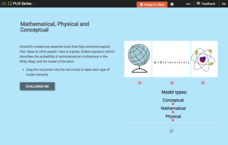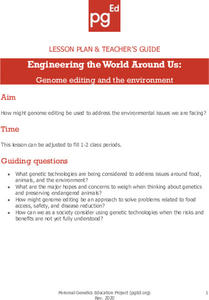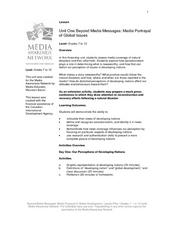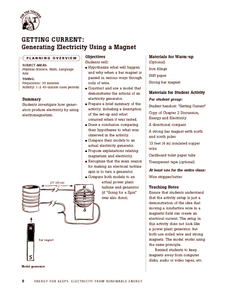Museum of Tolerance
The Price of Personal Responsibility
A reading of Patrick Henry's "Speech in the Virginia Convention," Henry David Thoreau's "Civil Disobedience," and Rev. Martin Luther King, Jr.'s "Letter from Birmingham Jail" launch a discussion about the price one is willing to pay to...
ReadWriteThink
Webcams in the Classroom: Animal Inquiry and Observation
Boost observational skills with an inquiry-based lesson that takes scholars on a virtual field trip. With help from webcams, learners observe animals in a zoo or aquarium. Observations go into a journal and a discussion is held to review...
Virginia Department of Education
Biotechnological Issues and Bioethics
Culminate a bioethics unit with the implementation of a lesson that incorporates the Socratic method to encourage class feedback and participation. Pupils participate in a discussion on bioethics and morality, complete a writing seminar,...
It's About Time
Who Eats Whom?
Packed with visual aids and multiple learning opportunities, an engaging exercise challenges individuals as they explore the role of producers, consumers, and decomposers. After discussing differences between food chains, food...
Columbus City Schools
Sedimentary Rocks
Turn your class discussion of rock formation from ho-hum to holy hornfels! Junior geologists gain experience in identifying rock types and rock origins, with an emphasis in hypothesizing the environment needed to form certain rocks. The...
Utah Education Network (UEN)
Utah Open Textbook: 8th Grade Science
The cycle of energy is important to many different systems on Earth. Scholars use questioning and observation to investigate the differences between renewable and non-renewable resources and how they relate to global changes. They...
McGraw Hill
Study Guide for A Wrinkle in Time
Mrs. Who, Mrs. Whatsit, and Mrs. Which would not be so confused if they had a study guide as great as this. Scholars increase their comprehension of A Wrinkle In Time through many supports such as guided questions, background...
Constitutional Rights Foundation
Refugees From Vietnam and Cambodia
The United States may have pulled its troops from the Vietnam War in 1973, but the conflict was far from over for the citizens living in Asia at the time. An informative resource lets learners know about the wave of over 220,000...
Curated OER
Teaching Controversial Science Issues Through Law Related Education
Discuss the differences in dialogue and debate when considering a controversial topic. Your class can work in small groups to complete a guided discussion of this controversial topic and then participate in a simulation of the Scopes...
Constitutional Rights Foundation
Educating European Immigrant Children Before World War I
As if surviving a journey to America wasn't enough of a feat for early 20th century immigrants, they then needed to settle into American life. Learn about the ways New York public education attempted to meet the needs of its students,...
Constitutional Rights Foundation
Refugees from the Caribbean: Cuban and Haitian “Boat People”
Should refugees fleeing poverty be allowed the same entrance into the United States as those fleeing persecution? High schoolers read about US foreign policy in the late 20th century regarding refugees from Cuba and Haiti, and engage in...
Consortium for Ocean Science Exploration and Engagement (COSEE)
Plankton to Penguins: Antarctic Food Web
A well-written lesson plan, second in a series of four, gets high schoolers exploring how the Antarctic food web is impacted by climate change and the associated melting of polar ice sheets. It begins with a PowerPoint presentation about...
Virginia Department of Education
A Salt Marsh Ecosystem
What a web we weave. Pupils use yarn as the primary resource to create a web depicting the intricacies of a salt marsh ecosystem. They participate in a question and answer session, which leads to an in-depth facilitated discussion about...
CK-12 Foundation
Modeling: Mathematical, Physical and Conceptual
Scientific models help explain ideas and concepts to non-experts. The online activity covers conceptual, mathematical, and physical models. Through four multiple-choice questions and three discussion questions, scholars gain a deeper...
Personal Genetics Education Project
Engineering the World Around Us: Genome Editing and the Environment
Challenge young minds to build a better world with genetic engineering. Biologists learn potential solutions for environmental issues using genome editing while interacting with three case studies. Scholars read articles and view...
Starry Night Education
The Year and Seasons
Turn your classroom into a live demonstration of how the earth and sun interact to create the four seasons. Using a globe, a light source, and a series of constellation cards, super scientists discover how the motion of these...
Bonneville
Solar Energy Equity and Sustainability
Generate some knowledge about generating electricity. Pupils first read several articles to learn about solar energy, its advantages and disadvantages, and advancements in technology related to solar cells. They then have a class...
Media Smarts
Forensic Science Crimes Dramas
How do TV shows present criminology—is it realistic? High schoolers research crime dramas and participate in class discussion about topics such as who exists as the target audience and the values the shows communicate. They also research...
Curated OER
Human Impacts on Sharks: Developing an Essay Through Peer-Review on a Discussion Board
Students develop a paper topic (in this case, the human impacts on sharks) that is peer reviewed by additional students answering guided questions. The original student must respond to the comments by the fellow classmates. All of the...
CPO Science
Physics Skill and Practice Worksheets
Stop wasting energy searching for physics resources, this comprehensive collection of worksheets has you covered. Starting with introductions to the scientific method, dimensional analysis, and graphing data, these skills practice...
National History Day
Helping Life and Aiding Death: Science, Technology, and Engineering at Work during World War I
Science, engineering, and United States history? Pupils research collections of artifacts from the Smithsonian to learn about historical scientific innovations. At the end of the lesson, they write an essay to discuss technology's...
Curated OER
Beyond Media Messages: Media Portrayal of Global Issues
Take a close look at news reporting techniques and global issues. Begin by creating a graphic representation of developing nations and defining the term. After class discussion, the second day's activities pick up by deconstructing news...
Energy for Keeps
Getting Current: Generating Electricity Using a Magnet
Give your class a magnetic charge with this creative experiment designed to teach emerging scientists about electromagnetism. Pupils construct a model that demonstrates the function of an electrical generator and test this creation in a...
Oregon State
World Map of Plate Boundaries
Young geologists piece together the puzzle of plate tectonics in an earth science lesson. Given a physical map of the world, they search for land formations that indicate the location of different types of plate boundaries.







